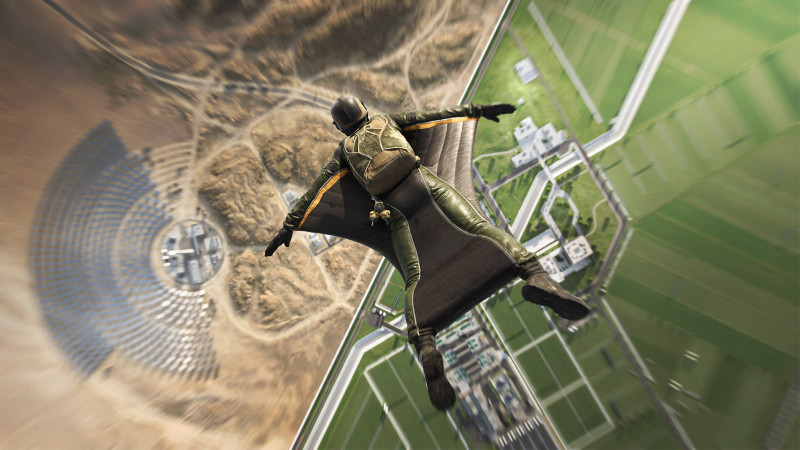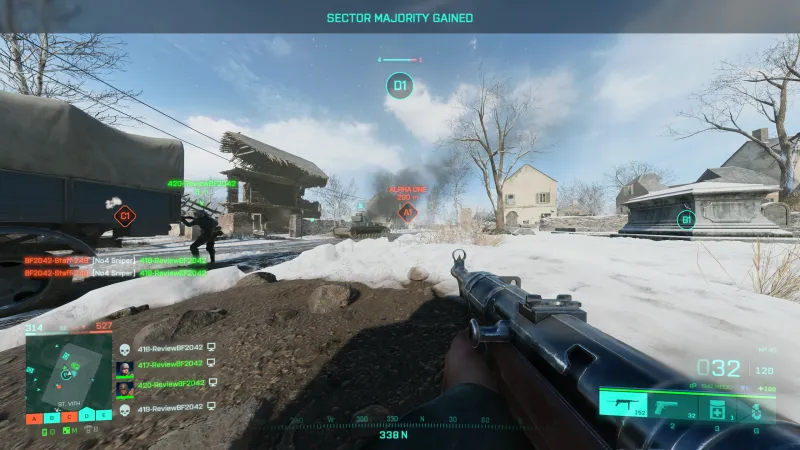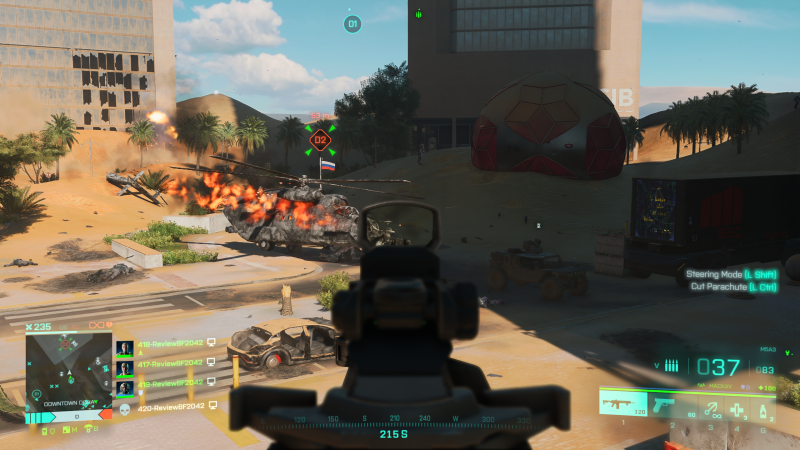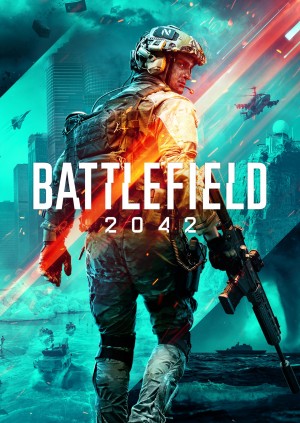
Battlefield has always been the largest and loudest multiplayer experience in the business. It’s the video game equivalent of Texas, and its bombast cannot be overstated. Battlefield 2042 offers a variety of ways to participate in simulated near-future warfare. Whether you prefer to fight via land or sky, you can experience dizzying on-screen explosions, tense firefights, and more vehicles than teammates who know how to drive them. Unfortunately, Battlefield 2042 is full of almost as many bugs as bad pilots, dragging down an otherwise solid online shooter.
If nothing else, Battlefield 2042 is familiar. It continues the series’ trend in delivering multiplayer maps with the largest player count possible and a range of reliable character archetypes that have become standard in first-person shooters. The newest addition to Battlefield’s long-standing formula is a weather system that lets you ride lethal tornados alongside the vehicles and debris they pick up on their route across the map. These storms are a neat touch and add a sense of panic to already-tense battles, but their inclusion feels inconsequential in the grand scheme. The 128-player matches and large maps guarantee dramatic moments, but there’s a thin line separating spectacle and chaos, and 2042 often devolves into the latter.
There’s never been a Battlefield game released without Conquest, the signature mode which tasks two opposing teams to capture and defend objective zones across the map. Each side has a limited number of reinforcements that slowly drain according to how many sectors the team controls. The popular format is alive and well in 2042, but unfortunately, it’s my least favorite way to play. For the first time, Battlefield hosts too many players in each match. Without the presence of Commanders to take charge of assaults, Conquest feels disorganized and incoherent at times since there’s no good way for all 64 players on each team to communicate and focus their attacks. Also, respawns frequently place you in the middle of a contested area only to be immediately killed by an enemy from somewhere off-screen.
Click here to watch embedded mediaEven if the larger picture is occasionally blurred, the moment-to-moment gameplay loop is fun. Gunplay is solid even though hits don’t always seem to register when they should, and the wide array of vehicles are equally entertaining to pilot when running on foot becomes tiresome. I was disappointed by the lack of naval warfare, which is notable considering its importance in the series and the fact that several maps are surrounded by large bodies of water.
Breakthrough is the second mode in the game’s multiplayer suite, and it provides more focused engagements by separating maps into multiple segments, each containing two Control Points. If the attacking team successfully captures all of the objectives in a zone, they can force the defending team to retreat to the next area. While Breakthrough still suffers from an inflated player count, it is undoubtedly the best path to participating in a traditional Battlefield experience.
Hazard Zone, a brand new multiplayer format introduced in 2042, pits eight squads of four against one another and tasks them with retrieving data drives located in satellite crash sites scattered across the map. Each location is guarded by opposing AI forces that attack your team on sight. Hazard Zone has no respawning unless your teammates have a Redeploy Uplink. The only way to win these matches is to extract in a highly-contested Helicarrier, which only visits the map twice throughout the game. If you miss the flight or die before making it onboard, it’s game over, and you lose the credits you spent in the pre-match munitions shop. However, if you successfully extract, you’re rewarded with Dark Market Credits, a meta currency that persists between games, which you can spend to purchase better gear before your next match. Hazard Zone is tense and strategic, and the white-knuckle firefights at the end of each game make it my favorite way to play Battlefield 2042.
Another new addition to the series is Battlefield Portal, a community-driven platform that players can use to make custom games or play others’ weird creations. For example, there’s a free-for-all rockets-only mode in which the only way to reload your launcher is to jump five times. Watching rockets fly across the screen in such a ridiculous scenario is hilarious, but like most of the games in Portal, the fun fades after a match or two.

In theory, Portal is an opportunity for players to create inventive spins on Battlefield, especially since the Battlefield Builder is easy to grasp and is accessible via a web browser. Portal lets you customize the game mode, map rotation, arsenal restrictions, and you can program advanced rulesets with visual scripting in the Logic Editor; however, the latter is less approachable to beginners. As a fan of past creative suites like Halo Forge and Fortnite Creative, I’m not compelled to interact with Portal’s tools since they’re designed for modifying existing game settings and don’t allow you to design your own original levels.
Portal also includes remastered versions of classic maps, and you can augment their rulesets or play them in their original form in a developer-featured playlist. I love this inclusion and am very happy to have a convenient way to return to beloved locations like Valparaiso, Caspian Border, or the Battle of The Bulge. These are effectively remastered versions of the series’ best maps, and I’m interested to see which ones DICE adds next.
Whether you’re grappling above the competition like Spider-Man, flying through a deadly tornado with a wingsuit, or sniping enemies from behind mobile barricades, each Battlefield specialist offers a unique way to participate in the battle. The title launched with ten specialists, and each of them falls into one of four classes: Assault, Engineer, Support, and Recon. You can fine-tune these characters in myriad ways (including being able to use any weapon). Still, my favorite customization feature is the option to swap weapon attachments mid-fight without needing to respawn. My go-to sniper lens is the 6X scope, but I found it convenient to switch to a different optic on the fly with the press of a button. This new feature vastly improves the multiplayer experience and should be adopted by other first-person shooters.

Battlefield 2042 includes seven maps at launch. Hourglass features an isolated city reclaimed by the neighboring desert, Discarded hosts colossal shipyards along India’s western coasts, and Breakaway is nestled amidst the icy mountains of Antarctica. The other maps – Manifest, Kaleidoscope, Orbital, and Renewal – are standard fare but still feature landscapes worth exploring. Every map is affected by violent weather systems that are exciting to navigate, but I wish more maps hosted unique elements like Orbital’s rocket launch and Breakaway’s explosive silos that permanently augment the map mid-match. Regardless, there aren’t any bad maps, and I enjoy playing on each of them.
Unfortunately, Battlefield 2042 currently feels underbaked due to an abundance of bugs. While most bugs I encountered are minor, each one dilutes the fun I have when playing. For example, the grappling hook’s zipline clipping through the front of the device during its animation or not being able to call in air support on a map like Hourglass because of an issue with the sand’s navmesh. More serious glitches can negatively affect gameplay, like when sniper scopes lose their magnification after interacting with gadgets like Irish’s mobile barricades. While playing on PC, the game also hard crashed to my desktop once during a week spent playing the game. One of my friends wasn’t as lucky and experienced several crashes in one of our play sessions. These crashes left me especially disadvantaged in Hazard Zone.
Don’t get me wrong: Battlefield 2042 is playable, packed with content, and often really fun. The title’s seven maps are distinct from one another, its bevy of customization options make it easy to play how you want, and I love the extreme weather systems and the quick-equip weapon feature. Portal hasn’t reached its full potential, but it introduces a convenient way to access six beloved experiences from Battlefield 3, Battlefield 1942, and Bad Company 2. Battlefield 2042 is an easy recommendation for existing fans or players looking for a modern war game, but I struggle to fully endorse it due to its current lack of polish. As long as DICE continues to publish hotfixes and patches as they have, Battlefield 2042 could eventually become a go-to online shooter, but it’s a shame it was released like this.
Battlefield 2042 was reviewed on PC with a code provided by the publisher for review purposes.

Score: 7
Summary: An otherwise solid online shooter bogged down by an abundance of bugs.
Concept: Battle for objectives across large-scale maps via land, sky, and in the middle of tornados
Graphics: The visuals are sacrificed in modes with larger player counts, but environments are rendered beautifully in smaller modes like Hazard Zone
Sound: Deep bass, large drums, and guttural synths comprise a familiar but compelling modern combat soundscape
Playability: Myriad customization options and approachable combat make for a varied first-person shooter
Entertainment: Each weapon has a unique feel that is fun to master and contested objectives always keep you busy
Replay: Moderately High
No comments:
Post a Comment